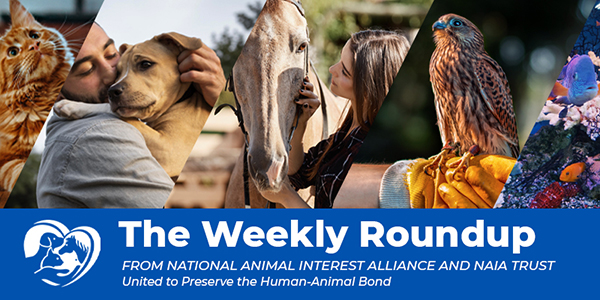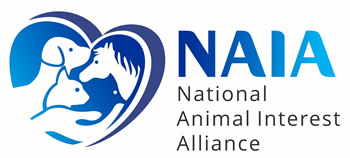
Inside This Issue:
- NAIA Board Member Accepts Role as President of the Independent Veterinary Practitioners Association
- Support Your State Fair!
- Sculpture Made of Seized Animal Parts a Symbol of Commitment to Combat Illegal Wildlife Trade
- Raccoon vs. Gator
- Do You Know Your Zoning Laws?
NAIA Board Member Accepts Role as President of the Independent Veterinary Practitioners Association

Just look at those smiling faces!
We are proud to announce that Dr. Arnold Goldman, a colleague, NAIA board member, and great friend, has accepted the role of president of the Independent Veterinary Practitioners Association (IVPA)! The IVPA is a nonprofit organization that advocates on behalf of independent veterinary practices. “Independent” in this sense refers to smaller, locally-owned clinics that aren’t affiliated with corporations, national chains, or industries – a feat unto itself in this era of corporate consolidation.
Dr. Goldman’s goal as president, is to grow the IVPA’s membership “by an order of magnitude, such that we qualify for admission into the AVMA House of Delegates as an Allied Group.” These aspirations may sound lofty, but given his long history of helping pets, pet owners, and distinguished service for national organizations (including NAIA!), we are definitely betting on his success. Congratulations, Dr. Goldman!
Support Your State Fair!

Hey, I just work here.
Greetings and salutations from the Wisconsin State Fair! This fair is held every year in West Allis, Wisconsin, a suburb of Milwaukee, and is one of the oldest state fairs in the United States. It typically takes place in early August and lasts for 11 days, attracting over a million visitors each year. Since Wisconsin is a predominantly ag state, there are animals everywhere, especially, as you may have guessed, dairy cows. Wisconsin cheese is in a whole category of its own culturally and in regard to flavor. As a traditional state fair, it features a strong focus on agriculture, including livestock shows and farming competitions.
There are more than prize-winning cows here, though. There are also mounted police, draft horse pulls with a horse dynamometer, and you can even pick up a pork chop from the Wisconsin Pork Association booth. The Ag Village highlights Wisconsin's rich agricultural heritage, with interactive exhibits, educational programs, and opportunities to see animals up close.
State Fairs preserve traditions by celebrating agricultural roots and heritage, and showcasing traditional farming practices, crafts, and rural lifestyles. They reflect the character and identity of the state, bringing together people from diverse backgrounds to celebrate shared values, traditions, and accomplishments.
Focusing on the animal side of things, fairs provide an important platform for local farmers, and serve as a learning experience, especially for urban residents and young people. These events provide education about animal agriculture, husbandry, and food production. Hands-on activities, demonstrations, and exhibits make learning interactive and engaging. Programs like 4-H and FFA are integral to state fairs, giving young people the opportunity to showcase their projects, compete in various categories, and develop skills in leadership, responsibility, and public speaking. Also, perhaps lost amidst all the talk about heritage and preservation, is the fact that state fairs often feature exhibitions that highlight the latest in agricultural technology, machinery, and techniques. This helps farmers and industry professionals stay informed about advancements. Late summer through early fall are when many state fairs are held. We are having a great time here, and hope you are able to make your state’s fair this year!
.
Sculpture Made of Seized Animal Parts a Symbol of Commitment to Combat Illegal Wildlife Trade

Loxodonta africana says hello.
A new Nigerian sculpture stands as a symbol of the country’s commitment to combating the illegal wildlife trade and its dedication to conserving native wildlife. The elephant sculpture, named “Giwa Statue of Renewed Hope,” is composed of unique resources to bring awareness to its origin: pulverized elephant ivory, pangolin scales, and the parts of several other poached and trafficked animals.
Throughout Africa, countries participate in the destruction of wildlife parts meant for the black market. By means of incineration, the National Environmental Standards and Regulations Enforcement Agency (NESREA), took the nearly 6 metric tonnes of ash and used it to fabricate the sculpture. Nigerian officials used the unveiling ceremony to express their dedication to preserving and protecting wildlife and to ask their citizens to never participate in poaching and only use sustainably sourced materials. CITES banned the trade of ivory back in 1989 but that has not stopped the ongoing demand for elephant tusks, which many say are worth more than gold.
Deeds are stronger than words and gestures, of course. But given the absolutely obscene value of the confiscated animal parts that make up this work of art, this is definitely an example of putting your money where your mouth is.
Raccoon vs. Gator

You mean I gotta carry them around for two years?
In Texas, a recent trail-cam video caught a plucky raccoon risking it all by sneaking into a mother alligator’s nest to steal one of her delicious (we can only assume) eggs. The raccoon’s audacity was impressive, as was its intelligence and patience – the critter had obviously scoped the place out and knew exactly when to skulk in for a bite. If you’ve dealt with nuisance raccoons before, watching this video probably gives you a sense of familiarity.
Now, reptile moms get a bum rap. Turtles are famous for laying their eggs then just kind of, well, wandering off. Meanwhile, a full 10% of the adult Komodo dragon’s diet is said to consist of… young Komodo dragons (interesting survival strategy). But it is worth noting that alligators (and crocodilians in general) guard their nests and can be ferociously protective of their young. They’re also pretty nurturing toward their offspring after they’ve hatched, sticking together for up to two years. In recapping the camera footage, it is noted that the mother “sniffs” about the nest after the raccoon’s heist, perhaps noting that one of her eggs is now missing. That’s a fairly big supposition to make, but it’s hard not to wonder!
So, in this contest, do you feel good for the raccoon or bad for the alligator?
Do You Know Your Zoning Laws?

Most people don't.
A Florida rescue owner was recently informed by the county that her non-profit is in violation of local zoning ordinances. She did not view running her nonprofit as “conducting a business on one’s property,” which runs afoul of county codes. And, considering she's been doing this for three years without receiving any violation warnings, she had no reason to think she was in the wrong. But unfortunately for her, the county does consider it a business, and they let her know that she needs to either shut down or change locations.
The woman has put her all into her rescue, which is laudable. However, she also mentioned having 40 (!) dogs on her property and that she has received numerous complaints from neighbors (just speculating, but do you think this is why she finally received a notice from the county?), which illustrates some of the reasoning behind zoning laws. The county leaders, for their part, say they feel she is providing a valuable service – they just want her to do it from an appropriate location.
There is an important lesson here for anyone who wants to partake in animal endeavors: knowing your local ordinances before you actually take on any animals is vital. Whether you are considering backyard chickens, an exotic pet or specific dog breed, or starting a rescue, you need to make sure everything is on the up and up before you become responsible for animals. Even if the ordinance seems unreasonable and/or is rarely enforced is beside the point – if you get hit with a violation, it’s bad news for your animals. In this case, the rescue owner is receiving a public hearing in order to share her case, which may allow everyone a satisfactory path forward, but a public hearing is still a hassle, and it is something we might not all be so lucky to receive.
Also in the News...
★ Meet the Colorado group that helps evacuate animals during emergency situations (Big Animal Rescue; Fighting the Clock)
★ Social rank may determine if animals live fast, die young (It's a Monkey Eat Sand World Out There)
★ Utica Zoo Mourns Loss of 2 Beloved Animals (Sad Goodbyes at the Zoo)
★ What were the first animals to have sex? (Prehistoric Ocean Square Dancing)
★ (Podcast) How local organizations are helping animals during the veterinary crisis (Vaccinations; Evictions; Community Outreach & Support)
★ Fayetteville Animal Services hosting 'Clear the Shelter' event (Rescue & Shelters; Events & Opportunities)
★ The 13 Deadliest Animals in California (Overstating Goofy Lists; Still Deadly for Your Pets, Though!)
Click here to see what is happening legislatively

